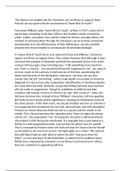‘The themes are weighty but the characters are too flimsy to support them.’
How far do you agree with this assessment of ‘Sweet Bird of Youth’?
Tennessee William’s play ‘Sweet Bird of Youth’, written in 1959, comes full of
big themes circulating in the late 1950s in the Southern States of America:
youth, reality, corruption, love and the American Dream, amongst others. His
method of communication through his characters can be at times somewhat
questionable as to the effectiveness of their deliverance, yet also possibly
precisely the vessel needed to communicate his intended message.
In ‘Sweet Bird of Youth’ there is an element of love but Williams’ characters
appear too flimsy to support them. One realises however that although it does
not serve this purpose, it illustrates perfectly the portrayal of love in its social
context. Princess gets close to feeling love: “I felt something in my heart for
you. That’s a miracle … the wonderful thing that happened to me”. Her speech
on love, much to the contrary is brief and out of the blue, questioning the
depth and sincerity of this declaration. Moreover, she does not say love,
merely that she felt “something”, which could signify a mountain of emotions
disguised in a veil as love: pity, compassion, identification, in itself proving she
isn’t sure what she feels. However, we get the feeling from the start real love
will not make an appearance, though its substitute of artificial and fake
emotions will instead. Princess in the first act asks “Did I mean it?” when she
declares she loves him. Instead of love, Williams’ characters call into question
the truth to one’s words and its significance, focusing on themselves in lieu of
the other person. In the final scene, we see yet another way love as a theme is
not supported but triumphed over by fame, personal gain and self-absorption:
Princess on recent discovery finds out she is a success and her career is not
ruined. Thus, Chance becomes the nameless voice “born to make this phone
call for me”, the preposition “me” stressing the character’s self-involvement,
also evident in the first quote mentioned. It is arguable love is portrayed as a
theme in a well-supported manner, just not love for others, but for oneself.
This is conveyed by Princess when she feels not love for Chance but for herself
as she believes she was born to own “the light again as a crown.” We observe
this with Boss Finley as well, when it seems his wife “was just a front for
[him]”, a cover and layer of self-protection: a cushion for his political career.
Whilst love is depicted by characters as too flimsy to portray love for others,
they are consistent in supporting self-love.





